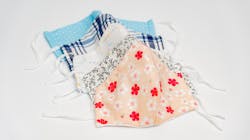Cloth face masks: Appropriate uses and how you can help
My mother was my first full-mouth series patient in dental hygiene school, before digital x-rays. Ignoring her quivering jaw and watery eyes, I coached her along, saying: “Bite all the way down. I have to get the apices, Mom. I'll be quick. It’s not that bad.” Soon after, it was my turn to have an FMX. That day I was introduced to the torture of mandibular periapicals taken by a student. I went home and apologized to my mother over and over again.
On day two of the COVID-19 stay-home order, my mother, an avid doll collector and seamstress extraordinaire, called to say she was taking a break from making doll clothes to make cloth face masks for her local hospital. Once again, I did not take her seriously. “Mom, is someone scamming you? Why would a hospital system reach out to you to make masks? Are cloth masks even effective? What level are they considered?” I asked, as if she were familiar with PPE lingo.
Shortly after our conversation, my inbox pinged with the notification “Calling all makers.” It was my own local hospital system asking for creatives to make and donate cloth face masks. I immediately thought of that day in the radiology clinic. Sorry, Mom. So it is a real thing. Hospital systems across the country are asking for help from anyone with a little sewing experience to make and donate cloth face masks.
A new mask option for dentistry?
Not so fast. The Centers for Disease Control and Prevention is clear: Cloth face masks are not considered PPE as their efficacy is variable and not well evaluated. The CDC only recently made guidelines for the use of cloth face masks as a means of “optimizing the supply of face masks due to the uncertainty of the global supply of personal protective equipment (PPE).”1 This option is a small part of the detailed strategies meant to reserve surgical and N95 masks for people who are already sick and the health-care workers who care for them. 2,3,4,5
If a dental office has a dwindling supply of face masks while handling emergency/urgent care-only appointments, caution needs to be exercised before popping a cloth mask into the autoclave and then using it to treat a patient, even with a face shield. According to the key remarks of the ADA’s Interim Guidance to Minimize Risk of COVID-19 Transmission for Emergency and Urgent Dental Patients and HCP, “if basic PPE, including surgical facemasks are not available, do not proceed with any dental procedure, regardless of emergency/urgent patients.”6
Vanderbilt University Medical Center’s cloth mask donation page further states: “While the Centers for Disease Control and Prevention does not suggest cloth material as a first-line defense against the coronavirus causing COVID-19, cloth masks work well for other conditions...”7 Other conditions can include wear by hospital employees not providing direct care, by asymptomatic patients, hospital visitors, and other community helpers and volunteers.
Feeling eager to help while your scalers are on furlough?
Deaconess Hospital offers a database of organizations across the country in need of donated cloth face masks. You don’t need to have extensive sewing experience. You can also help by supporting Twice as Nice Uniforms’ cloth mask initiative. They are on a mission to manufacture and donate as many cloth masks as possible to individuals and small community needs. Learn more here.8,9
References
1. Centers for Disease Control and Prevention. Strategies for optimizing the supply of facemasks. Mar. 17, 2020. https://www.cdc.gov/coronavirus/2019-ncov/hcp/ppe-strategy/face-masks.html
2. Centers for Disease Control and Prevention. Use of cloth face coverings to help slow the spread of COVID-19. Apr. 13, 2020. https://www.cdc.gov/coronavirus/2019-ncov/prevent-getting-sick/diy-cloth-face-coverings.html
3. Davies A, Thompson K-A, Giri K, et al. Testing the efficacy of homemade masks: Would they protect in an influenza pandemic? Disaster Med Public Health Prep. 2013 Aug;7(4):413-418. https://www.ncbi.nlm.nih.gov/pmc/articles/PMC7108646/
4. MacIntyre CR, Seale H, Dung TC, et al. A cluster randomised trial of cloth masks compared with medical masks in healthcare workers. BMJ Open. 2015;5(4):e006577. https://www.ncbi.nlm.nih.gov/pmc/articles/PMC4420971/
5. Shakya KM, Noyes A, Kallin R, Peltier RE. Evaluating the efficacy of cloth facemasks in reducing particulate matter exposure. J Expo Sci Env Epid. 2017;27:352-357. https://www.nature.com/articles/jes201642#MOESM10
6. American Dental Association. ADA interim guidance for management of emergency and urgent dental care. Updated April 1, 2020. https://www.ada.org/~/media/CPS/Files/COVID/ADA_Int_Guidance_Mgmt_Emerg-Urg_Dental_COVID19.pdf?utm_source=cpsorg&utm_medium=cpsalertbar&utm_content=cv-pm-ebd-interim-flowchart&utm_campaign=covid-19
7. Vanderbilt University Medical Center. Coronavirus (COVID-19) information for employees and patients. How to donate hand-sewn face masks. 2020. https://www.vumc.org/coronavirus/how-donate-hand-sewn-face-masks
8. Deaconess Health System. Organizations needing mask donations. 2020. https://www.deaconess.com/How-to-make-a-Face-Mask/Mask-Donations
9. Twice as Nice Uniforms COVID-19 masks. Fundraiser organized by Debora McKenzie Carrier. Created Mar. 21, 2020. gofundme website. https://www.gofundme.com/f/twice-an-nice-uniforms-covid19-masks?utm_source=customer&ut
Christie Lincoln, RDH, is a practicing clinical hygienist, mother of three, and cohost of the MOMgienists podcast. She is also the founder of yoursmilinghygienist.com.
About the Author
Christie Lincoln, RDH
Christie Lincoln, RDH, is a practicing clinical hygienist, mother of three, and cohost of the MOMgienists podcast. She is also the founder of yoursmilinghygienist.com.
